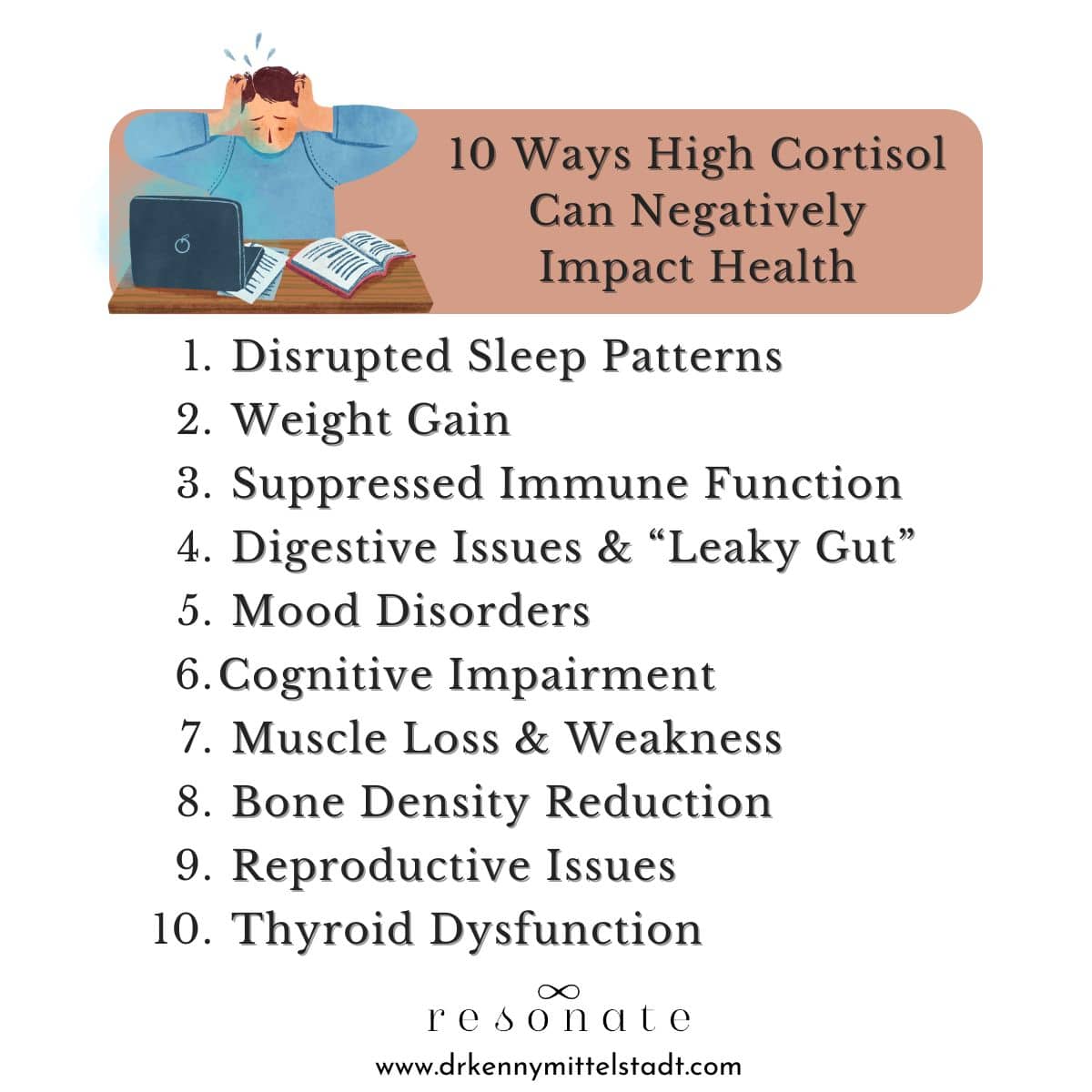In the intricate symphony of hormones that direct the functions within us, high cortisol can be a heavy hitter. It can throw the whole orchestra out of tune! Functional medicine recognizes that chronically elevated cortisol has the potential to set the stage for disease and dysfunction.
Often referred to as our “stress hormone”, cortisol is designed to surge in periods of stress (think fight or flight). Normally, after a quick surge, cortisol SHOULD return to normal and we return to a balanced relaxed state.
However, in today’s fast-paced, competitive, and ever-shrinking world, we are overwhelming this normal alert system. Our chemistry doesn’t quite distinguish the difference between running from a tiger versus sitting in rush hour traffic. Or consider the ever increasing workplace demands, or raising children in our world today, and the list goes on.
Cortisol is a key hormone that orchestrates our response to stress, metabolism, immune function, and so much more. This very same hormone, when chronically elevated, can lead to a cascade of detrimental effects on our health.
Join me as we uncover the mysteries of high cortisol and uncover 10 ways it can silently sabotage our health. Brace yourself for insights that might just reshape your understanding of stress and its impact on your own body.
The Normal Functions of Cortisol
To start, cortisol is so much more than a “stress hormone.” Though it plays a major role in coordinating our response to stress, almost all of our body tissues have receptors for cortisol; this means almost all of our body tissues respond in some way to stress.
Cortisol is a steroid hormone produced by the adrenal glands, which are found on top of the kidneys.
Here are a few of the most common functions of cortisol, when balanced and functioning normally:
- Regulates blood pressure
- In regular amounts, supports the immune system
- Releases stored glucose from the liver for immediately available fuel when stressed
- Helps wake you up in the mornings
- Helps you respond to danger
When cortisol is in balance and when our stress response easily returns to normal, these functions work and respond to our environment as usual. When cortisol is “stuck” in a chronically elevated state or even depleted, symptoms and dysfunction may arise!
Chronically Elevated Cortisol & HPA Axis Dysfunction
Cortisol is one of the hormonal components of our master control system known as the HPA Axis. HPA Axis stands for hypothalamus, pituitary, and adrenal axis; this axis represents the coordinated system that responds to stimuli in our environment.
Chronically, or even traumatically, elevated cortisol has the ability to throw off the balance of this system over time. This leads to an imbalanced state known as HPA Axis Dysfunction.
Think of HPA Axis dysfunction like the gradual effects of insulin resistance, but applied to this system involving cortisol. Though a different mechanism, I would argue it’s not unlike our current epidemic of insulin resistance.
Read more about HPA Axis Dysfunction (AKA “Adrenal Fatigue”) here
It’s also important to note that this discussion about HPA Axis Dysfunction and chronically high cortisol levels is outside the scope of the primary medical diagnoses of adrenal insufficiency, Cushing’s syndrome, and Addison’s disease. These are medical conditions that affect the adrenals and cortisol levels, and require conventional medical management.
What causes chronically high cortisol levels?
You want the short answer?… Stress.
Stress, in its many and sustained forms, is what leads to chronically high cortisol levels. Now when we think about stress, many stop at mental and emotional stress. But stress comes in many forms.
I like to categorize stress into the following “big three” areas of stress.: Emotional, dietary, and inflammatory stress.
You can sort most stressors that we encounter into one of these three categories, and many even overlap. If you desire a little challenge, check out the following list of common sources of stress (in the broadest sense of the word). See if you can sort them into the “Big Three” sources of stress.
- Demanding job or toxic workplace
- Fried foods, trans fats, and high glycemic index foods
- Toxic chemicals in cosmetics, household cleaners, etc.
- Moving, changing school, new jobs
- Overeating or skipping meals
- Being prejudiced against or oppression
- Financial hardship
- Chronic pain
- Conventional gluten and dairy products
- Overexercise and underexercise
This is just a short list of potential stressors that we encounter regularly.
Read about 12 Hidden Sources of Stress for more information here!
You might try and identify some of the most common stressors in your own life. I always tell patients that “when you can define something, you can deal with something.” The point of this self reflection is to create awareness and space to define stressors so that we can more strategically confront them or seek out resources.
10 Ways High Cortisol Negatively Impacts Health
Just as cortisol plays many roles throughout the body when functioning normally, it has the potential to affect many areas when out of balance as well. Below are 10 possible ways that high cortisol might be impacting your own health.

Disrupted Sleep Patterns
High cortisol levels can disrupt the delicate balance of our natural circadian rhythm. It can make it harder to relax and unwind, difficult to fall or stay asleep, and contribute to early risings or unrestful waking. It may be a major contributor to feeling “tired but wired.”
Weight Gain
High cortisol levels can make you more likely to gain weight by making you crave sugary or salty foods. It also coordinates the storing fat, especially around your midsection. Lastly, it can disrupt your body’s ability to use insulin properly, which can raise your blood sugar levels and lead to more fat being stored.
Suppressed Immune Function
When cortisol levels are high, it can weaken your immune system by slowing down the action of immune cells. It also reduces the production of important substances that help fight off infections. This means you might get sick more often or take longer to recover.
Digestive Issues & “Leaky Gut”
High cortisol levels can disrupt your digestive system by increasing stomach acid production and slowing down digestion. This can lead to issues like bloating, heartburn, and even “leaky gut” or intestinal permeability; the latter can underlie many immune and autoimmune conditions.
Mood Disorders
High cortisol levels can disrupt the balance of neurotransmitters in your brain, like serotonin and dopamine. These chemicals play a big role in how you feel. This imbalance can lead to mood swings, anxiety, and even depression.
Cognitive Impairment
High cortisol levels can make it harder for you to think clearly and remember things. It does this by interfering with the communication between the cells in your brain. This might make you feel foggy-headed, forgetful, or have trouble concentrating on tasks.
Muscle Loss & Weakness
Cortisol is considered a catabolic hormone (hormone that breaks down tissues). High cortisol levels can break down muscle tissue for energy. This can lead to muscle and other protein loss and a feeling of overall weakness in your body.
Bone Density Reduction
Another catabolic effect of cortisol is through the breakdown of bone so that the body may mobilize calcium stores. Too much cortisol and overall bone breakdown can increase the risk of osteoporosis and bone fractures.
Reproductive Issues
High cortisol levels can disrupt the balance of reproductive hormones in your body. These hormones affect your menstrual cycle or sperm production and maturation. This disruption can lead to irregular periods, fertility problems, decreased libido, and even erectile dysfunction.
Thyroid Dysfunction
High cortisol levels interfere with the conversion of inactive to active thyroid hormone. This slows the function of the thyroid gland, which can lead to hypothyroid states. Common symptoms include fatigue, weight changes, and difficulty regulating body temperature.
If you experience any of the above concerns, you might consider the role of elevated cortisol through the stressors of many forms.
Conclusion: Functional Medicine & Cortisol Imbalance
As we wrap up our exploration of how high cortisol levels can throw our bodies out of balance, it’s crystal clear that stress isn’t just a mind game—it’s a full-body experience.
And that’s where functional medicine steps in. It recognizes the pivotal role of chronically elevated cortisol and HPA Axis Dysfunction in our health journey.
But don’t worry! I’m not just here to list problems; I’m here to offer solutions.
Consider diving deeper with functional medicine lab testing and programs designed to support your body in navigating stress and its myriad effects. I often start by addressing chronic stress and HPA Axis Dysfunction, as it tends to affect almost every condition!
If this resonates with you, share with a friend who is seeking some wellness guidance. Follow me on Instagram and start a conversation. You can also join my mailing list below to receive updates on future blog content and other developments!
“Health is contagious, share the love!”
About the Author
Kenny Mittelstadt is an acupuncturist and functional health practitioner based in San Antonio, Texas. He is trained through the Institute for Functional Medicine and received both of his doctorate degrees with highest honors from Southern California University of Health Sciences. He focuses on empowering patients through creating opportunities for integrated understanding and personalized root-cause healing - starting with gut health and growing beyond!

